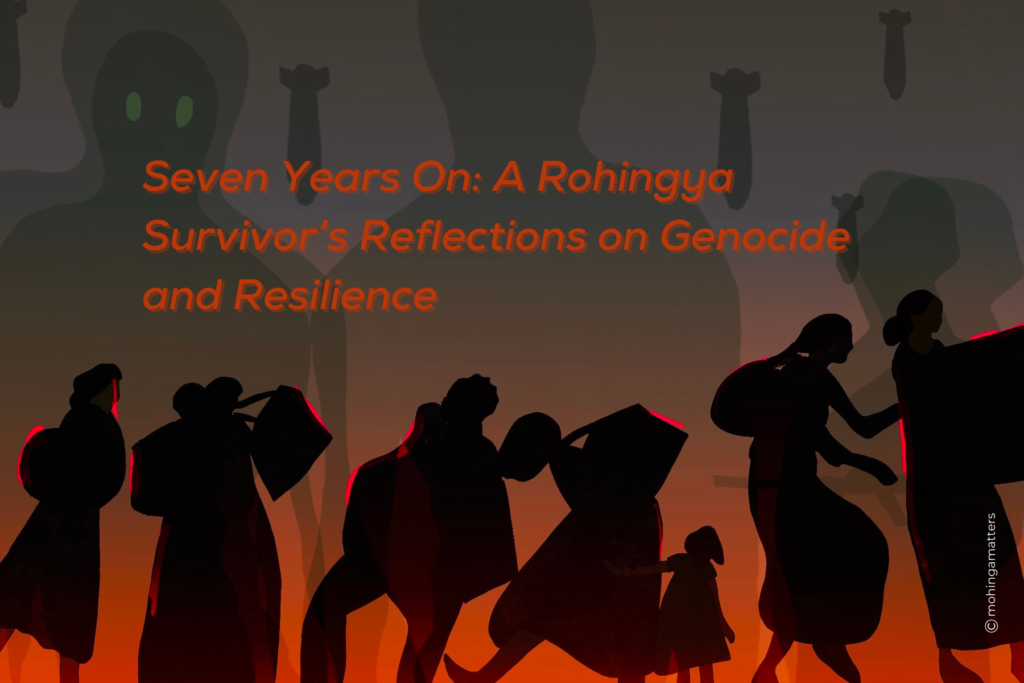
As we mark the seventh year of the Rohingya genocide, we remember the brutal campaign of violence that began in August 2017, when the Myanmar military unleashed a deadly crackdown on the Rohingya ethnic group. Over 700,000 Rohingya were forced to flee their homes as villages were burned, thousands were killed, and countless others suffered atrocities such as rape, torture, and displacement.
To commemorate this tragic anniversary, we spoke with Ro Osmun, a survivor of the genocide who now resides in Mae Sot, Thailand. In this interview, Ro reflects on his escape from Myanmar, the enduring hardships faced by Rohingya refugees, and his perspective on the current political climate in Myanmar.
MM: It has been seven years since the Myanmar military carried out genocidal actions against the Rohingya in 2017. Can you share your personal experiences and emotions, as well as those of your family, from that time?
Ro Osmun: My family and I have faced many challenges, and the history is endless. I’ll try to highlight some key moments. At that time, we were nearly killed by the relentless firing of the Myanmar military. They didn’t allow us to take anything for survival as we were forced to leave our home. The worst part was when the military fired at us even while we were crossing the river. Fortunately, we survived somehow. But many innocent lives were lost, including children and pregnant women, while crossing the Naf River due to their firing. It was the most horrifying and terrible situation I have ever faced.
MM: What is the current situation like for you? And what are the main challenges faced by Rohingya refugees living in camps along the Bangladesh border and in several countries?
Ro Osmun: The biggest challenge that Rohingya people face in the Bangladesh camps, in IDP camps, and in many other countries is the lack of freedom and access to equality. Wherever you go, if you are Rohingya, you will not have proper rights, basic human rights, or freedom of movement. This is the most significant challenge that the Rohingya people face everywhere.
MM: What are your thoughts on the fact that, even now, the Myanmar military has not been held accountable for their actions?
Ro Osmun: In my opinion, it seems like no one cares that Rohingya people are also human beings. This is why the international community has failed to take action against the massacre of Rohingya by the Myanmar military. It’s clear that the international community has all the necessary evidence: the military has killed many Rohingyas, burned their houses, and seized all their properties. Yet, the international community remains silent because they don’t see the Rohingya as humans.
MM: With the Spring Revolution gaining momentum across Myanmar, challenging the military’s grip on power, how do you feel about this movement? Are you hopeful?
Ro Osmun: I still feel hopeless because we haven’t seen any positive action from the Myanmar Spring Revolution towards the Rohingya community. For this reason, we Rohingya are not hopeful that the Myanmar Spring Revolution will bring us justice and equality through their movement.
MM: There have been recent allegations that the Arakan Army (AA), a major force in Rakhine State, is conducting targeted attacks on Rohingya. What is your perspective on this situation?
Ro Osmun: The Arakan Army is clearly trying to cleanse the Rohingya ethnic group from Arakan to rename the state and not allow any Rohingya to live there. The main reason behind AA targeting the Rohingya is ethnic cleansing, similar to what the Myanmar military did before. Killing an ethnic group is not revolution. They claim they are liberating the state, but in reality, they are systematically cleansing the Rohingya.
MM: The Myanmar military has exploited ethnic divisions by arming certain Rohingya individuals in Rakhine State and using them against resistance groups in clashes. What are your thoughts on this strategy?
Ro Osmun: The purpose of this strategy is ethnic cleansing and the erasure of the Rohingya from Arakan
MM: With the ongoing revolution, many old ideas in Myanmar, such as nationalism, religious divides, and ethnic prejudices, are being challenged. Do you believe general sentiment towards the Rohingya has shifted during this time?
Ro Osmun: Indeed, many sentiments have shifted during this time and before, but they have not had a real impact on the ground.
MM: What conditions need to be in place in Myanmar, particularly in Rakhine State, for Rohingya people to return to their homes safely?
Ro Osmun: There must be equal rights for people of all backgrounds. The systematic rules that have been designed specifically to oppress the Rohingya for decades must be abolished. Basic human rights and dignity must be guaranteed for everyone, regardless of their class or ethnicity. Only then can Rohingya people return home safely.

